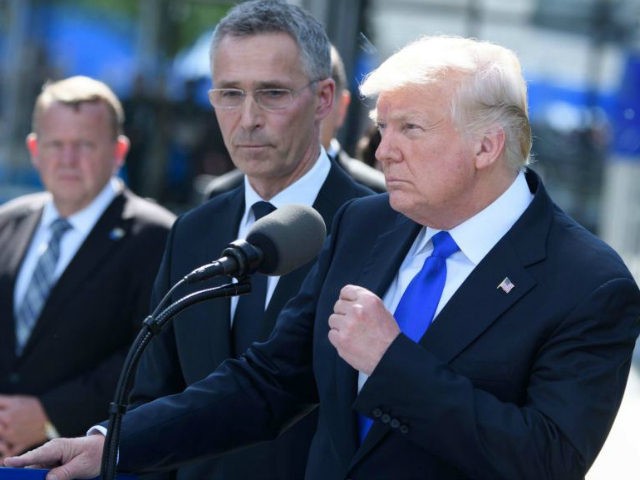Disbelief and acrimony met Trump’s recent visit to Europe. European leaders at first were bemused and later angry at Trump’s lack of commitment to several Western inspired initiatives. Some interpreted the public spat as an ominous sign that the West is in decline, while others chose to emphasize the leadership void left behind America.
Comment:
There is no doubt that Trump’s agenda was to disrupt Western unity. His lack of commitment to NATO’s Article V threats to overhaul America’s trade deficit with Germany, and withdrawal from the Paris agreement hammered home to the Europeans that America no longer viewed Europe as an equal partner. On the contrary, Trump unequivocally set a negative tone regarding the transatlantic relationship between Europe and the US.
However, this is not the first time that Europe has fallen out with America. Since the end of the Cold War, several fault lines have emerged to undermine the unity of the West. The most notable schism between America and Europe surfaced in the run-up to the Iraq war in 2003. But that dispute pales in comparison to the present trans-Atlantic rift between Germany and America which threatens to tear apart the entire West front. Merkel said, “The times in which we can fully count on others are somewhat over, as I have experienced in the past few days. And so, all I can say is that we Europeans must really take our destiny into our own hands.” (The Telegraph)
The cleft between Europe and America rests on two different views about international relations. Europeans, led by Germany, adhere to international liberalism which at its heart stresses the importance of collective security, cooperation between great powers, peace accomplished through the spread of democracy and free trade, and a strong belief in international institutions underpinned by international law. Incidentally, America in the past has also voiced support for some of these ideas, but its reliance on unilateralism often punctuated relations with Europe. Largely both Europe and America are credited for creating the liberal order and acting as its guardians.
With the departure of Obama and the ascendency of Trump, the liberal order is in flux. This is because Trump is a proponent of the Hobbesian view of international relations in which self-preservation of the state or national interest, aggression, and might are right dominate relationships with nations. This means that relations between nations are merely transactional, and partnerships are eschewed—if they do exist, they are simply temporary in substance. Last month, the Trump administration advocated this idea as a cornerstone of its America first foreign policy, “the world is not a ‘global community’ but an arena where nations, nongovernmental actors, and businesses engage and compete for advantage.” Hence, in Trump’s world, foreign policy is transactional only, and great emphasis is placed on deal making as opposed to building a durable relationship. This is evident from Trump’s visit to Saudi Arabia where he extorted $350b from the Saudis in exchange for their security, and in Europe, he refused to endorse the climate agreement citing that it hurt the American economy.
With Europe and America parting ways, an opening has arisen for other great powers to play more of a leading role in international affairs. Ostensibly, China has indicated its preference for the liberal order and is actively supporting the Paris agreement and other international treaties. How far China will go towards embracing the liberal order remains an open question. Meanwhile, Russia is more calculated in its approach exhibiting both traditions in its foreign policy. The UK has a self-inflicted wound through Brexit, and no longer enjoys good relations with the EU. The current attempts by Trump to isolate Qatar through Saudi endeavors reveal Britain’s brittleness in protecting its surrogates abroad.
One actor notably absent from this discussion is the Islamic ummah which lacks a true state to represent it in the international arena. However, the deep schisms in the West and the lack of alternatives offered by great powers to replace the broken liberal order present a golden opportunity for the sons of the ummah to restore the rightly guided Khilafah, Caliphate, and to capture the international situation for Islam.
The Khilafah could easily support Germany by supplying it with cheap oil and encouraging it to militarize. Such a development would draw Britain, France and Russia to counter German expansionism; thereby, plunging the European continent in another great war. Just over a hundred years ago, Sultan Abdul Hameed II used Germany to counter Russia, Britain and France but failed due to internal betrayals. This time round the nascent Khilafah could pull off an extraordinary feat by encouraging China to take back Taiwan and other disputed territories. The crisis on two fronts will expose America’s weakness and severely undermine its ability to respond effectively to the Khilafah efforts at unifying Islamic lands. Is there anyone amongst the armies of the Muslim world who heeds this observation during the blessed month of Ramadan? Remember the words of Allah about making the possible real:
وَمَنْ يَتَّقِ اللَّهَ يَجْعَلْ لَهُ مَخْرَجًا * وَيَرْزُقْهُ مِنْ حَيْثُ لَا يَحْتَسِبُ وَمَنْ يَتَوَكَّلْ عَلَى اللَّهِ فَهُوَ حَسْبُهُ إِنَّ اللَّهَ بَالِغُ أَمْرِهِ قَدْ جَعَلَ اللَّهُ لِكُلِّ شَيْءٍ قَدْرًا
“And for those who fear Allah, He (ever) prepares a way out, And He provides for him from (sources) he never could imagine. And if any one puts his trust in Allah, sufficient is (Allah) for him. For Allah will surely accomplish his purpose: verily, for all things has Allah appointed a due proportion.”
(65:3)
Abdul Majeed Bhatti

